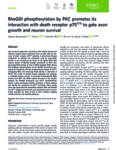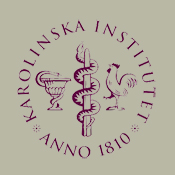|
|
UPDATE : the position has been filled.
We are seeking a talented and enthusiastic researcher with expertise in medicinal chemistry and chemical biology to advance drug discovery efforts and investigations on death receptor signaling and physiology in cancer and neuronal cells. The research entails medicinal chemistry studies on small molecules targeting the p75NTR death receptor identified in our ongoing screens, with the objective to improve the pharmacokinetic and biological properties of chemical leads. Please see Goh et al. (2018) Cell Chemical Biology 25, 1485–1494 for a representative publication of this work.
Candidates will be accepted at the postdoctoral level with a PhD awarded within the last 3 years. Strong and documented expertise in medicinal chemistry and chemical biology is a requirement for consideration. The successful candidate is expected to be sufficiently independent to formulate questions, design experiments and perform research. Excellent command of the English language is reuqired.
Applications, including CV (no diploma copies needed at this time please), list of publications and statement of research interests should be sent by email to Prof. Carlos Ibanez ( ) and through the job web page of Karolinska Institute. Applicants should arrange to have at least two confidential letters of reference sent independently by referees to this email address. Funding is available for an initial period of 3 to 4 years. ) and through the job web page of Karolinska Institute. Applicants should arrange to have at least two confidential letters of reference sent independently by referees to this email address. Funding is available for an initial period of 3 to 4 years.
Deadline for application is 29 September 2019.
UPDATE September 2019: The position has been filled.
We are seeking talented and enthusiastic researchers with expertise in molecular and cellular neuroscience to advance investigations on the functions and mechanisms of growth factor receptor signaling and physiology in the nervous system. The research entails studies of different receptor systems in neuronal and nervous system function using molecular methods, cell culture models and mutant mice carrying specific mutations in these receptors.
Candidates will be accepted at the postdoctoral level with a PhD awarded preferably within the last 3 years. Strong and documented expertise in molecular, cellular and histological methods of analysis as applied to studies of mouse models in the area of neuroscience is an absolute requirement for consideration. Successful applicants shall be well versed in mouse brain neuroanatomy and physiology. Expertise in analysis of mouse behavior will be an additional advantage. The successful candidate is expected to be sufficiently independent to formulate questions, design experiments and perform research. For more information and publications, please look HERE in our lab website.
Applications, including CV, list of publications and statement of research interests should be sent through the job web page of Karolinska Institute: Applicants should arrange to have at least two confidential letters of reference sent independently by referees to that email address.
Deadline for application is 15 September 2019.
UPDATE 2017-05-29: Position still open.
We are seeking a talented and enthusiastic researcher with expertise in cellular electrophysiology to advance investigations on the functions and mechanisms of neurotrophic signaling networks in the adult nervous system. The research entails functional assessment of neuronal circuits in the brains of mutant mice lacking different neurotrophic factor receptors in specific subpopulations of neurons.
Candidates will be accepted at the postdoctoral level with a PhD awarded preferably within the last 5 years. Strong and documented expertise in electrophysiological methods as applied to studies of the rodent central nervous system, such as electrophysiological recordings from brain slices, is a requirement for consideration. Experience on calcium imaging would be an advantage.
The successful candidate is expected to be sufficiently independent to set up electrophysiological methods at our laboratory, including supervision of purchase, installation and maintenance of the necessary equipment.
Applications, including CV, list of publications and statement of future interests should be sent to Prof. Carlos Ibanez  . Applicants should arrange to have at least two confidential letters of reference sent independently by referees to this email address. . Applicants should arrange to have at least two confidential letters of reference sent independently by referees to this email address.
Funding is available for an initial period of 3 to 4 years, starting any time during 2017.
UPDATE 2017-05-29: The position has been filled.
We are seeking a talented and enthusiastic researcher with expertise in molecular and cellular neurobiology to advance investigations on the functions and mechanisms of neurotrophic signaling in the nervous system. The research entails studies of death receptor signaling pathways in cell culture models as well as phenotypic characterisation of mutant mice carrying specific mutations in neurotrophic factor receptors. Please refer to our recent list of publications in this area HERE.
Candidates will be accepted at the postdoctoral level (PhD awarded within the last 5 years). Strong and documented expertise in cellular, molecular and histological methods as applied to studies of the rodent nervous system is a requirement for consideration. Experience with genetically modified mice is highly desirable. The successful candidate is expected to be sufficiently independent to formulate questions, design experiments and perform research.
Our group belongs to a network of laboratories dedicated to different aspects of neuroscience research and provides a strong environment for scientific growth and career development.
Applications, including CV, list of publications and statement of future interests should be sent to Prof. Carlos Ibanez  . Applicants should arrange to have at least two confidential letters of reference sent independently by referees to this email address. . Applicants should arrange to have at least two confidential letters of reference sent independently by referees to this email address.
Funding is available for an initial period of 3 years, starting any time during 2017.
Deadline for application is March 7, 2017.
UPDATE 2016-05-25: The position has been filled.
We are seeking a laboratory technician to help us with histological studies of our lines of mutant mice. The candidates should have documented expertise in histological techniques, including tissue sectioning, immunohistochemistry and microscopy. Experience in histological analysis of nervous tissue is preferred. This is a project employment for a period of up to 2 years.
Application, including CV and reference names of two latest project supervisors should be sent to Prof. Carlos Ibanez 
Deadline for application is 29th April, 2016
Work at Carlos Ibanez laboratory focuses on understanding the functions and signaling mechanisms of growth factors and their receptors in neural development and injury responses and metabolic regulation, for the development of better therapies to diseases of the nervous system and metabolic disorders.
Carlos Ibanez is Professor of Neuroscience at the Karolinska Institute in Stockholm, Sweden.
Postdoctoral fellows are currently being recruited to the laboratory to advance research on growth factor receptor signaling and function in neurodevelopment and neural injury. We are seeking talented, innovative and enthusiastic researchers with a PhD awarded within the last 5 years. Candidates with expertise in i) molecular and cellular neurobiology, neurodevelopment or ii) molecular and cellular endocrinology, metabolic research and iii) mouse genetics are encouraged to apply.
Applications, including CV, list of publications and statement of future interests should be sent to Prof. Carlos Ibanez ( ). Applicants should arrange to have at least two confidential letters of reference sent independently by referees to this email address. ). Applicants should arrange to have at least two confidential letters of reference sent independently by referees to this email address.
Funding is available for an initial period of 2 to 3 years, starting any time during 2014.
Deadline for application is May 10, 2014
Work at our laboratory focuses on understanding the functions and signaling mechanisms of neuronal growth factors in neural development, injury responses and metabolic regulation, for the development of better therapies to diseases of the nervous system and metabolism.
Postdoctoral fellows are currently being recruited to the laboratory. We are seeking talented, innovative and enthusiastic researchers with a PhD awarded within the last 10 years. Candidates with expertise in neurobiology, metabolism and mouse genetics are encouraged to apply.
Applications, including CV, list of publications and statement of future interests should be sent to Prof. Carlos Ibanez  . Applicants should arrange to have at least two confidential letters of reference sent independently by referees to this email address. . Applicants should arrange to have at least two confidential letters of reference sent independently by referees to this email address.
Funding is available for an initial period of 2 to 3 years, starting any time during 2013.
Deadline for application is March 31, 2013.
A postdoctoral position is available for experienced molecular endocrinologists to join our team investigating the role of growth factor signaling in metabolic regulation using mouse models carrying mutations in the Activin receptors ALK7 and ALK4, novel regulators of glucose homeostasis and energy balance (see Bertolino et al. and Andersson et al., PNAS 2008). The aim of the project is to understand the functional role of activin signaling through ALK7 and ALK4 in pancreatic islets and its contribution to the regulation of insulin secretion and glucose homeostasis. In order to tackle these questions, we have recently generated conditional and chemically inducible mutant mouse lines which will be available for analysis at the start of the project.
We are seeking a talented, innovative and enthusiastic researcher with a PhD awarded within the last 4 years. Highly motivated candidates with a genuine interest in metabolic regulation and mouse genetics are encouraged to apply. Priority will be given to candidates with strong expertise in pancreatic islet biology and studies of insulin secretion and glucose homeostasis.
Applications, including CV, list of publications and statement of future interests should be sent to  . Applicants should arrange to have at least two confidential letters of reference to be sent directly by referees. . Applicants should arrange to have at least two confidential letters of reference to be sent directly by referees.
Funding is available for an initial period of 2 years, starting any time during 2012.
Review of applications will begin immediately and will continue until the position is filled.
A postdoctoral position is available for experienced neurobiologists to join our team investigating the role of GDNF and its receptors in the control of cortical interneuron development and function (see Pozas et al. Neuron 2005 and Canty et al. J. Neurosci. 2009). The aim of this research is to elucidate novel pathways regulating the diversification, migration and allocation of cortical inhibitory interneurons. In order to tackle these questions, we have at our disposition a battery of conditional and inducible mutant mouse lines which will be available for analysis at the start of the project.
We are seeking a talented, innovative and enthusiastic researcher with a PhD awarded within the last 4 years. Highly motivated candidates with a genuine interest in developmental neuroscience, signal transduction and mouse genetics are encouraged to apply. Priority will be given to candidates with strong expertise in one or more of the following areas: mouse forebrain development, cell transplantation, birth dating and lineage analyses, neuron primary culture, cell signaling assays and cell microscopy.
Visit the lab Open Positions page for details on how to apply.
At the end of this month, the first deadline for postdoc position in several projects at our lab is closing. Visit the Open Positions page for more details.
|
|
 ) and through the job web page of Karolinska Institute. Applicants should arrange to have at least two confidential letters of reference sent independently by referees to this email address. Funding is available for an initial period of 3 to 4 years.
) and through the job web page of Karolinska Institute. Applicants should arrange to have at least two confidential letters of reference sent independently by referees to this email address. Funding is available for an initial period of 3 to 4 years.

